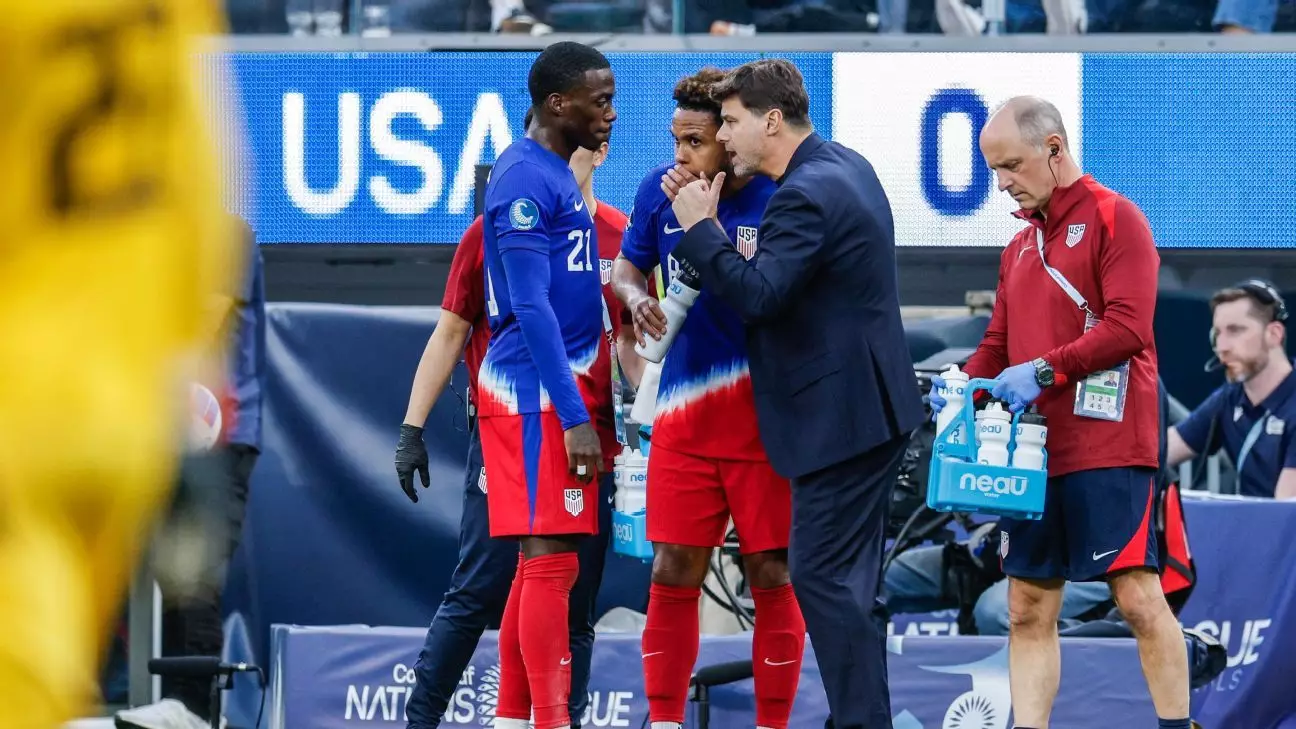The United States men’s national soccer team has once again entered the realm of disappointment, reflecting a systemic issue that has marred American soccer for years: complacency. As manager Mauricio Pochettino lamented after the 1-0 defeat to Panama in the Concacaf Nations League semifinals, showing up in a national team jersey is not a guarantee of success. This isn’t just a post-match platitude; it’s a troubling insight into the mentality that has infiltrated the team culture. In a match where the U.S. dominated possession at an unsettling 66% yet still failed to deliver meaningful chances, one has to wonder: how much longer can we ignore that simply holding the ball won’t translate to actual success?
Pochettino’s frustration highlights an alarming fact—the U.S. seems trapped in a repetitive cycle where overconfidence supersedes the requirement for grit and determination. Holding the ball doesn’t equate to controlling the game, and the numbers bear this out. A meager expected goals (xG) of 0.68 reveals just how little the team managed to threaten their opponents, emphasizing a crucial disconnect between possession and offensive efficacy.
Creativity in Recovery or a Missed Opportunity?
In the face of adversity, especially when the U.S. was on the brink of elimination, one would realistically expect a spark of creativity to emerge from the bench. Yet, Pochettino’s decision to hold back creative players like Giovanni Reyna and Diego Luna until later stages bafflingly illuminated a reluctance to take risks. Why reserve players who could change the game for ‘extra time’? The very approach reflects a misplaced tactical ideology that clings to safety instead of capitalizing on creativity.
One can only speculate whether this hesitation stemmed from a lack of trust in younger talents or simply a failure to read the urgency of the situation. When facing a team that had previously eliminated them in major tournaments, one would hope to see the U.S. adopt a more aggressive stance rather than tiptoe around the pitch, as Pochettino observed. Especially against a side like Panama, the U.S. needed to unleash whatever spark of creativity it could muster, and by not doing so, they not only limited their options but also squandered potential opportunities.
The Tale of Two Teams: Grit vs. Complacency
The juxtaposition between the United States and Panama couldn’t be clearer. While the U.S. sought solace in possession, Panama stepped onto the field with the tenacity of a team that had something to prove. Just minutes before the final whistle sounded, substitute Cecilio Waterman seized the lone opportunity available and clinched an emphatic win for Panama. This stark contrast forces us to reevaluate the U.S. approach to games like this one. It isn’t merely about wearing the badge—it’s about embodying its spirit.
Looking back at Pochettino’s admission regarding the lack of aggression in the first half, one can’t miss the implications of such a performance. A slow, complacent start allows the opponent to gain confidence and capitalize on the U.S.’s weaknesses. The U.S. players were not merely outplayed; they were out-thought and out-fought. The U.S. needs to learn the lesson that participation alone won’t cut it — they must redefine what it means to represent the badge.
A Broken Cycle of Underachievement
As the loss marks yet another chapter in a history of underwhelming performances, fans and critics will undoubtedly raise questions about not just the tactics, but also the overall mindset of these players. Three consecutive defeats to Panama in official competitions can’t merely be brushed aside; they are symptoms of a team grappling with its identity and vision. There’s no denying that Pochettino has inherited a team at a crossroads, but it remains to be seen if he can instill the necessary mentality to rise above it.
With a third-place match against Canada on the horizon, the question looms larger: How can the U.S. shake off this bitter setback? For a national team that aims to compete at a global level, it may soon be time for a cultural reset. As hard as it is to accept, if players continue to prioritize safety over audacity, then they are set to remain spectators in world soccer rather than contenders. It’s high time to abandon the complacency that has stifled talent for far too long and start playing to win—the American way.

